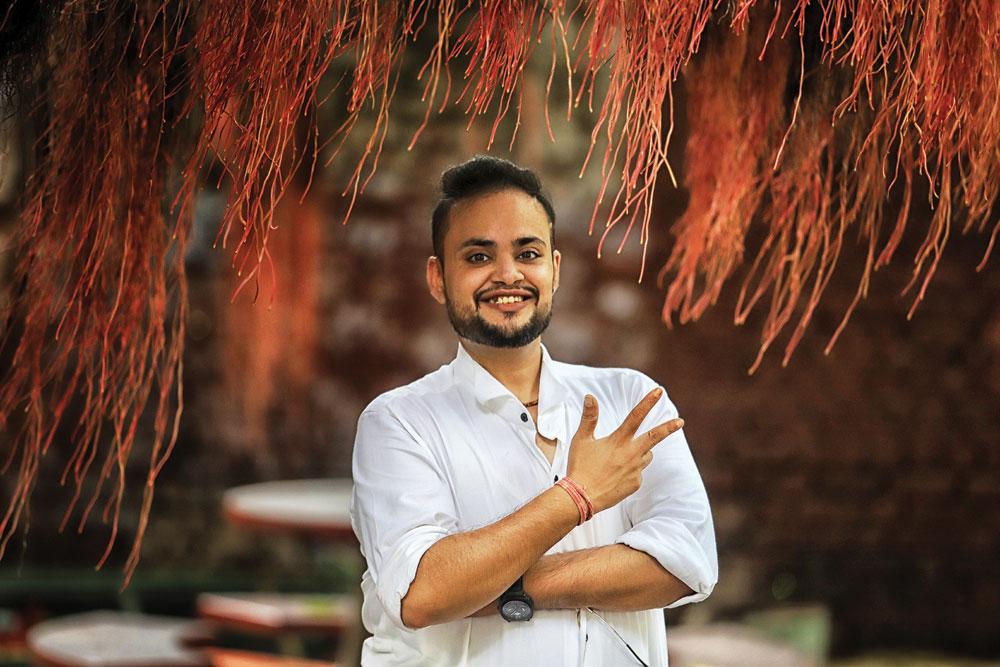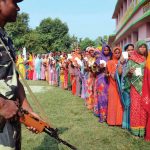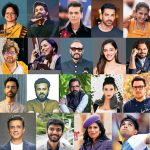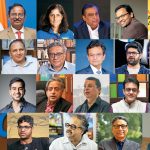The Right to Love
Social pressures still make it difficult for same-sex couples
 Nikita Doval
Nikita Doval
 Nikita Doval
Nikita Doval
 |
13 Aug, 2021
|
13 Aug, 2021
/wp-content/uploads/2021/08/Righttolove1.jpg)
(Illustration: Saurabh Singh)
AS ANYONE WHO has ever lived in the capital will tell you, getting pulled over by the traffic police is a typical Delhi experience. It is a curious mix of muscle-flexing and bluster with an undercurrent that could either turn hostile or friendly in the blink of an eye. But for Saransh Pathak, 37, there is always an added layer of uncertainty to the experience. “Appearance-wise, I am a man, but my driving licence identifies me as a woman. This always leads to an awkward conversation as my application to change my gender is still pending. Once a cop laughingly said, should we declare you a man? And I said, please do. Because then I will be able to say that at least Delhi Police has certified my gender. Maybe, then things will change,” says Saransh during a phone conversation with Open.
Saransh identifies as a transman; an individual who was born a woman but now identifies as male. “There is very little awareness about transmen and women in India. People often confuse us with eunuchs or the third sex, but we are all separate categories. As a transman still in the process of being recognised as a male, I spend a lot of time educating people, be it in my family or at work.” Saransh works for a very conservative employer—the Government of India— but his colleagues have slowly started coming to terms with him. At home, his mother is a reluctant convert with limits to her understanding. “I really want to get married, but I know she will not accept a woman as my partner.” Not that it has any bearing on Saransh’s desire who has even taken out matrimonial advertisements in classifieds as a transman. “Everyone has a right to love and to find the person they love. Why should society or courts have a say in who we want to be with?”
In an ideal world, Saransh would never have to ask this question. In an ideal world, love would indeed flourish without any restrictions, bound by no considerations; be it of gender or sexuality. But the world we live in isn’t ideal. And it isn’t just ideal for Saransh who defies heteronormative norms of gender and sexuality. It is also not ideal for Ankita Khanna and Kavita Arora, a couple fighting to legalise same-sex unions in India. And neither is it ideal for a young woman from Gujarat who had to leave her home state in the middle of the night with her partner because of their desire to get married. They belong to different religious communities.
After the abrogation of Section 377, technically all Indians, irrespective of sexual orientation, have the right to love whoever they want to, but even after 75 years of Independence, this is easier said than done. Society still gets in the way of love, the legitimisation of love still an all-important goal to be sought, especially when practical considerations like bank accounts and living wills come into consideration.
The Centre argued that when Section 377 of the Indian Penal Code (IPC) was struck out, it decriminalised homosexuality. It did not legitimise it
In an interview to TIME magazine in January this year, Arora and Khanna said the pandemic influenced their decision to stand up for their rights, especially with the point of view of being able to take medical decisions for each other. The Centre has opposed their petition on the ground that marriage in India necessarily depends upon “age-old customs, rituals, practices” and the institution has “sanctity.” A same-sex relationship is not comparable with the Indian family unit concept of a husband, wife and children. The Centre also argued that when Section 377 of the Indian Penal Code (IPC) was struck out, it decriminalised homosexuality. It did not legitimise it.
“When you are young, you feel that your sexual orientation is a deeply personal issue, meant to be tackled only by you. Your family doesn’t need to know, your office doesn’t need to know and anyhow a relationship is between two individuals and entirely their business. But all that begins to change as you get older. Even something as basic as renting an apartment becomes a minefield,” says Parul Thapa, who works in the development sector and is one half of a same-sex couple. For Thapa and her partner, the fight to legalise same-sex marriages is a war, but one populated with a million small battles. In Thapa’s case, for instance, it is the right to be recognised as a co-parent of her partner’s child.
Societies across the world have frowned upon the idea of free will in love at some point of time or the other. “Until the late eighteenth century, most societies saw marriage as far too vital an economic and political institution to be left entirely to the free choice of individuals,” writes family historian Stephanie Coontz in her book Marriage, a history. Marriages were never about individual desires but rather the need of the group. In largely conservative setups like India, the choice of one’s partner can be seen to have deep ramifications on a family’s standing in society. It directly leans into notions of caste purity and a family’s “honour” even today. Any attempt to extend the definition of marriage or its legitimacy is perceived as a direct threat to the existing structures of society, so much so that defying it can be a life-threatening prospect, even for couples on the heteronormative spectrum.
In 2007, Manoj Banwala and Babli of Karoran village in Kaithal, Haryana, eloped and paid for this transgression with their lives. It wasn’t the first case of honour killing but led to the conviction of the khap panchayat, a community organisation. The accused, relatives of the victims, were awarded capital punishment, which was eventually commuted to life. In 2018, the Supreme Court declared any attempts by khap panchayats to end marriages between consenting adults illegal. However, “honour killings” remain a bitter truth of Indian society even today, especially in the case of inter-caste unions. Such unions directly speak to patriarchal fears of “bloodlines” getting “diluted” and so great is the loss of face that only violent death can redeem the lost “honour.”

Inter-faith marriages, though perceived to be equally problematic by society, have by and large remained under the radar, especially once the families of both the boy and girl consent to the union. “Even if cases were filed, the police did not have the authority to act if the girl was an adult and there was express consent. But now increasingly we find that the girl’s version is being discarded,” says Dhanak’s Asif Iqbal.
Dhanak for Humanity is a not-for-profit organisation that works on the issues and challenges faced by interfaith and inter-caste LGBTQ couples and individuals who choose to assert their autonomy. When Open speaks with Iqbal, he is in the thick of case hearings, including that of the couple from Gujarat. “They had applied for a licence under the Special Marriage Act and news had leaked. Her father is being threatened with financial harm and she is also worried about her younger siblings. When they called me a few days ago, I had offered them the option of a safe house in Gujarat itself, but they wanted to come to Delhi,” he says.
The atmosphere for inter-faith marriages is becoming increasingly so hostile that even when parents are on board, societal pressure forces them to change their stance. “Inter-faith marriages push boundaries. They challenge age-old notions of societal differences and ways of life,” says Iqbal. And when young men and women start taking their own decisions of who to marry and when to marry, irrespective of caste and creed, it is bound to shake up rigid institutions and thought processes that still seek to define how people should live their lives.
Recently, an LGBTQ couple was in the news for seeking shelter at a Delhi government safe house, meant for couples on the run. Dhanak was instrumental in placing the couple, one of whom identifies as a transman, there. “In the case of heterosexual couples, once the marriage is solemnised, there is hope for acceptance from families, but same-sex couples do not have that option. Parents almost never give up in such cases. The threat of being separated is always there,” says Iqbal.
Once a cop laughingly said, should we declare you a man? And I said, please do. Because then I will be able to say that at least Delhi Police has certified my gender, says Saransh Pathak, transman
Today, the conversation around sexuality has progressed far beyond the wildest imagination of the first generation of LGBTQ activists in India. The first pride parade that ever took place in India was in 1999, and was initially referred to as a friendship walk. For Prafful, an airline pilot based out of Delhi, a turning point in his life was the first pride parade held in Delhi in 2008. The colourful photographs splashed on the frontpages of newspapers gave him a foot in the door as far as a conversation with his mother was concerned about homosexuality. Hundreds of kilometres away in Bengaluru, Parul, also attending her first pride parade the same year, started coming to terms with the fact that her sexuality wasn’t just a “phase” or a “fun experiment.”
“Social media has been a gamechanger in terms of redefining whatever was once considered normative behaviour. You can make a community faster, voices get amplified faster. There are support groups in schools, there are support groups for parents. Countries talk now thanks to the internet. Netflix and other platforms have made it possible for us to access LGBTQ cinema. Earlier, everything was brushed under the carpet; now, it is possible to have a conversation. And you don’t know just how important representation is until you realise that it is missing for you,” says Saurabh, Prafful’s partner. Saurabh feels that perhaps his coming-out experience would have been more positive if he had access to stories like his.
Saurabh is an MNC employee whose employer is an international giant and while there are LGBTQ-friendly policies in place as well as celebrations around pride month, he would rather not talk about his sexuality at the workplace. “Honestly, there is still such an inherent bias and assumptions of what ‘normal’ sexual behaviour is, that I’d rather not talk about it [sexuality]. I get good ratings at work, I don’t know how my career would be impacted.” For Saurabh, it is not just children confused about their sexuality who need allies, but even adults like him. “Even if I want to talk to someone or share with them, I will observe them carefully, try and figure out what their thoughts are on the subject, what kind of literature do they consume.” Sounds exhausting. It is, he admits. “I am not an activist. I am just a simple guy who goes to work and who has a personal life, but I also realise that if you want to be yourself, then you have to fight for that right.”
Saurabh’s experiences with his colleagues seem to suggest that even for his contemporaries, there is safety in conformity. Iqbal confirms this even in the case of couples who have earlier defied norms to get married. “We upload testimonials of couples, and it is not unusual to receive a request a year or so later to take it down. Parents eventually come around, but they would rather that the union remains muted.”
The idea of love and sex disconnected from the larger aspects of society such as caste, class, religion and gender can be terrifying, and hence the desperation to hold on to the norms that exist
THERE ARE MANY layers to peel to get to the heart of society’s objection to same-sex, inter-caste and inter-religious unions. For filmmaker Paromita Vohra, it is not about the right to marry whoever one wants to because according to her, marriage is anyhow a normative institution that seeks to limit who it will let in and will not. “It is about the assertion of personal liberty. Thanks to the internet, the distinction between rural and urban behaviour is not so marked. There is increasing acceptance that girls will marry later. There is conversation around happiness, articulation of intimate thoughts.”
Vohra is the brain behind Agents of Ishq, a multimedia project that encourages wholesome conversations around love, sex and desire. People from across the country are encouraged to send in their experiences, their fantasies, their thoughts. The project is an attempt to create a space where people can talk about love, sex, sexuality with honesty. Over the years, the project has thrown up several surprises and quite a few revelations. Vohra feels that there is a lot of sexual curiosity but without any moral hang-ups amongst men and women today. There is experimentation, there is increasingly a sense of playfulness and fun as far as desire is concerned. “And the backlash you see is because of that. There is fear of desire, it can be all-pervasive, controlling.” The idea of love and sex disconnected from the larger aspects of society such as caste, class, religion and gender can be terrifying, and hence the desperation to hold on to the norms that exist. But Vohra is also vocal in her rejection of marriage as the only “legitimate partnership.” She argues that even if we expand the ambit to same-sex couples, we will still be excluding someone in those inclusions—transgenders, for instance.
Saransh is quite aware that while people still know about same-sex couples now, transgenders are met with a sense of incredulousness. His very presence threatens people’s notions of masculinity and there is often sniggering when he expresses a desire to get married. “I have a younger sister. She has been married for eleven years. She says that even if I do get married, the children will not be mine biologically and as such they will have no claim to our parental property.” Saransh has trans-couple friends who have lived under the radar for more than a decade now, and even have children. They prefer to keep their identity a secret even from their immediate in-laws for fear of retribution. “The option to live a covert life is always there, but I don’t want that.” Unlike Saurabh and Parul, who are vocal about their desire to leave the country, Saransh doesn’t have that option. “I am an ordinary person with simple dreams and aspirations. How can we assign heteronormative norms to dreams? The right to love is universal.”

/wp-content/uploads/2025/06/Cover-OpenMinds2025.jpg)












More Columns
Puri Marks Sixth Major Stampede of The Year Open
Under the sunlit skies, in the city of Copernicus Sabin Iqbal
EC uploads Bihar’s 2003 electoral roll to ease document submission Open